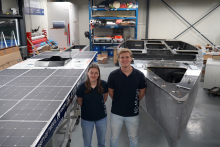After months of conflicts with the university administration, the editors of Cursor (Eindhoven University of Technology) blacked out the website in October 2023: a protest against the chief editor’s suspension. A year later, the Executive Board of TU Delft forced the news medium Delta to remove a critical article, and in 2022, hackers took down the website of the Maastricht news medium Observant. They accused the editors of ‘transphobic language’. These and other high-stakes conflicts around academic press freedom have made the national press in recent years. What is the current state of press freedom in higher education media? And what lessons do editors draw from such incidents?
Fixation on image
Bridget Spoor was pretty ‘flabbergasted’, she says afterwards. As editor at Eindhoven University of Technology’s news medium Cursor, Spoor had been told that editor-in-chief Han Konings would not be publishing her article about a professor’s transgressive behaviour. Not because she did not have enough sources or evidence, but because the editorial board did not agree. Although Konings was formally allowed to publish, he still refrained from doing so because of serious tensions with the Executive Board. He also refused to publish a critical piece on the new rector some months later. ‘He was like, it’s a good piece, but publishing it will wreck relations with the board and invite reprisals’, Spoor says. ‘We’ll lose funding, or lose our jobs. And I said: if that argument is in our heads, we are already lost.’
Afterwards, an independent commission ruled that the university administration had violated the internal rules around Cursor’s press freedom by exerting mental pressure on the chief editor.
Controversies around press freedom in higher education media have not just sprung up in the last few years. Ries Agterberg, chief editor of DUB (Utrecht University), says administrators’ fears of unpalatable news about their campus rose particularly sharply in the nineties. A neoliberal political trend encouraged institutions to engage in constant competition and to be fixated on their own image. ‘This profiling by the universities themselves has abated a bit’, according to Agterberg. ‘Back then, they were much more sensitive about negative news leaking out. Today, you find they mainly try to avoid giving offence, for example around diversity. They ride along on a given trend.’
Even so, potential reputational damage caused by negative news remains a sensitive issue for many executive boards, as interviews with eight news platforms show. For example, Saskia Bonger, chief editor of Delta, talks about the strained contact with certain press officers who have since left. ‘They would often question our integrity. If we had questions, there would be a protracted discussion on whether they were the right questions. It was obvious to me this was intended to get us to doubt ourselves. It was clear gaslighting.’
Weak editorial statute
Edith van Gameren, chief editor of Profielen (Rotterdam University of Applied Sciences) says the editorial staff has disagreements around press freedom once a year on average. ‘There’s always friction. Suppose we find a shortcoming in the quality of education. We will ask the Executive Board for their response, since the university’s purpose is to provide good education. At that point, they may try to pull the emergency brake by going to the editorial board. A game of sorts will then ensue: What’s the point of writing this? Did we observe the rules of good journalism?’
The editorial board bases its judgment on the editorial statute, but journalistic independence is not the statute’s leading principle.
‘Our statute says we must serve the interests of the university of applied sciences’, Van Gameren points out. ‘That’s a formulation that allows for restrictions on what we can write. When does transparency stop serving the institution’s interests?’
The situation of Profielen is not exceptional. At Cursor, too, things got out of hand partly because of an editorial statute that prohibited journalists from harming the institution’s interests. The editorial statute has since been replaced with a robust document that better enshrines Cursor’s press freedom. ‘It feels like a buffer now, a protective layer that fits like a glove’, Spoor observes. ‘We’ve also been allowed to nominate people with journalistic expertise for the editorial board. All the checkboxes are ticked now, which gives me peace of mind.’
In Delft, the conflict between Delta and the university administration also led to a revision of the editorial statute, and other editorial boards too are currently revising their charter. Although the editors of Resource (Wageningen University & Research) are rarely on a collision course with the current Executive Board, chief editor Willem Andrée prefers to err on the side of caution. ‘Our statute will now also get an additional sentence saying that Resource cannot be used for any particular interest. It is not marketing. Universities are funded by public money and that simply involves a countervailing power.’
Bullying with money
Like some other higher education media, the UKrant at the University of Groningen is run by an independent foundation. According to chief editor Rob Siebelink, this makes the buffer between the newspaper and the Executive Board just that little more shockproof. ‘Formally speaking, I can give the president of the Board the proverbial middle finger. No one can touch me in my capacity as editor, because I don’t have to answer to the Executive Board.’ Notwithstanding, he puts this privileged position into perspective. ‘The Board does have the ability to say: we value an independent press, but next year you’re getting less money. This happened about seven years ago. It was presented as necessary cost cutting, but it was just bullying. In the final analysis one is always dependent in that sense.’
The importance of money as something that stimulates press freedom comes up in several of the interviews with editorial staffs. Asked if he is free to write what he wants, Jan Ligthart of Bron (Fontys University of Applied Sciences) answers with a resounding ‘yes’. Whether he has the time to do so is a separate matter. ‘With three FTEs, we’re one of the least funded media in the realm of education. Our immediate neighbour, Cursor, has an editorial staff of over six FTEs, although their university is a third the size of Fontys. Sometimes the editorial board comes up with good tips and I think: yes, I thought of that myself, but with our staffing we just can’t get that done.’
Harassment
It is not only administrators who sometimes make things hard for higher education media. Students, too, regularly make themselves heard because they disagree with the content or, on second thoughts, they want their name removed from the website.
Once something appears on the Internet, all and sundry can find it back even years later. Editor-in-chief Wieneke Gunneweg of Erasmus Magazine remembers when students once tried to haul away stacks of newspapers because they were unhappy about the content. Anyone seeking to cancel a publication now must prevail on the editors to take it offline. Attempts to do so can sometimes take on nasty forms, Gunneweg says. ‘A few weeks ago, we ran a story about a party for queer students of colour. One of our freelancers who likes going to such parties wrote a feature on it. It escalated drastically, although we simply worked conscientiously and in accordance with journalistic rules. Our employee was intimidated really badly.’
Gunneweg now finds there is greater pressure on press freedom from disgruntled students than from troublesome administrators. ‘I’ve seen this in the last few years. I sometimes trace it back to the COVID period, when social developments became turbocharged, with groups pitted against each other. Everything you find in society also enters the universities.’
Siebelink recognises this. ‘I usually have more problems from that angle than from the university administration. Last year, for example, pro-Palestinian activists set up a tent camp next to the editorial office. I come from the newspaper world, I’ve been in wars, so threats don’t get to me easily. But what they did back then was intimidating. Attacks would be ad hominem: ‘Rob Siebelink, you are the chief editor, you have blood on your hands if you’re not for us.’ That kind of thing.’
Last year, there were three occasions when Siebelink felt he had to report threats and harassment to the police. ‘Polarisation and hardening stances are something of a feature of society. But when you find yourself going to the police three times, it does give you pause for thought.’
To avoid anger and misunderstanding, Gunneweg tries to be more transparent about journalistic decisions. In accountability boxes, Erasmus Magazine explains how articles were created. In parallel, the chief editor has begun to monitor her own boundaries a little more closely. ‘In the past, when people walked into our office seething we’d drop everything and have a dialogue with them. There came a point when I said: right, we’re not going to go on like this. If someone’s angry, fine. Can we settle the matter in five minutes? If we can’t, you’ll just have to make an appointment.’







